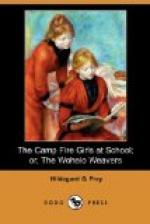Sahwah knew that her failure to come from school would call out a search, but who would ever look for her in the statue on the stage? Her only hope was to wait until the play was in progress and the door was opened to conceal the child. Then another thought startled her into a perspiration. She was in the opening scene of the play. If she was not there, the play could not commence. They would spend the evening searching for her and the statue would not be opened. What would they do about the play? The house was sold out and the people would come to see the performance and there would be none. All on account of her stupidity in wedging herself inside of the statue. Sahwah called herself severe names as she languished in her prison. Fortunately there were enough holes in the thing to supply plenty of ventilation, otherwise it might have gone hard with her. The cramped position became exceedingly tiresome. She tried, by forcing her weight against the one side or the other, to throw the statue over, thinking that it would attract attention in this way and some one would be likely to open it, but the heavy wooden base to which it was fastened held it secure. Sahwah was caught like a rat in a trap. The minutes passed like hours. Sounds died away in the building, as the last of the lingerers on the downstairs floor took themselves off through the front entrance. She could hear the slam of the heavy door and then a shout as one boy hailed another in greeting. Then silence over everything.
A quarter, or maybe a half, hour dragged by on leaden feet. Suddenly, without noise or warning, two figures appeared on the stage, coming on through the back entrance. Sahwah’s heart beat joyfully. Here was some one to look over the scenery again and if she could only attract their attention they would liberate her. She made a desperate effort and wrenched her mouth open to call, only to get it full of fuzzy cotton wool that nearly choked her. There was no hope then, but that they would open the door of the statue and find her accidentally. She could hear the sound of talking in low voices. The boys were on the other side of the statue, where she could not see them.
“Let it down easy,” she heard one of them say.
“Better get around on the other side,” said a second voice.
The boy thus spoken to moved around until he was directly before the opening in front of Sahwah’s eyes. With a start she recognized Joe Lanning. What business had Joe Lanning on the stage at this time? He was not in the play and he did not belong to the Thessalonian Society. There was only one explanation—Joe was up to some mischief again. She had not the slightest doubt that the other voice belonged to Abraham Goldstein, and thus indeed it proved, for a moment later he moved around so as to come into range of her vision. The two withdrew a few paces and looked at the statue, holding a hasty colloquy in inaudible tones, and then Joe, mounting a chair, laid hold of the Maid just above the waist line, while Abraham seized the wooden base. Sahwah felt her head going down and her feet going up. The boys were carrying the statue off the stage and out through the back entrance, over the little bridge at the back of the stage and into the hall. It was the queerest ride Sahwah had ever taken.




